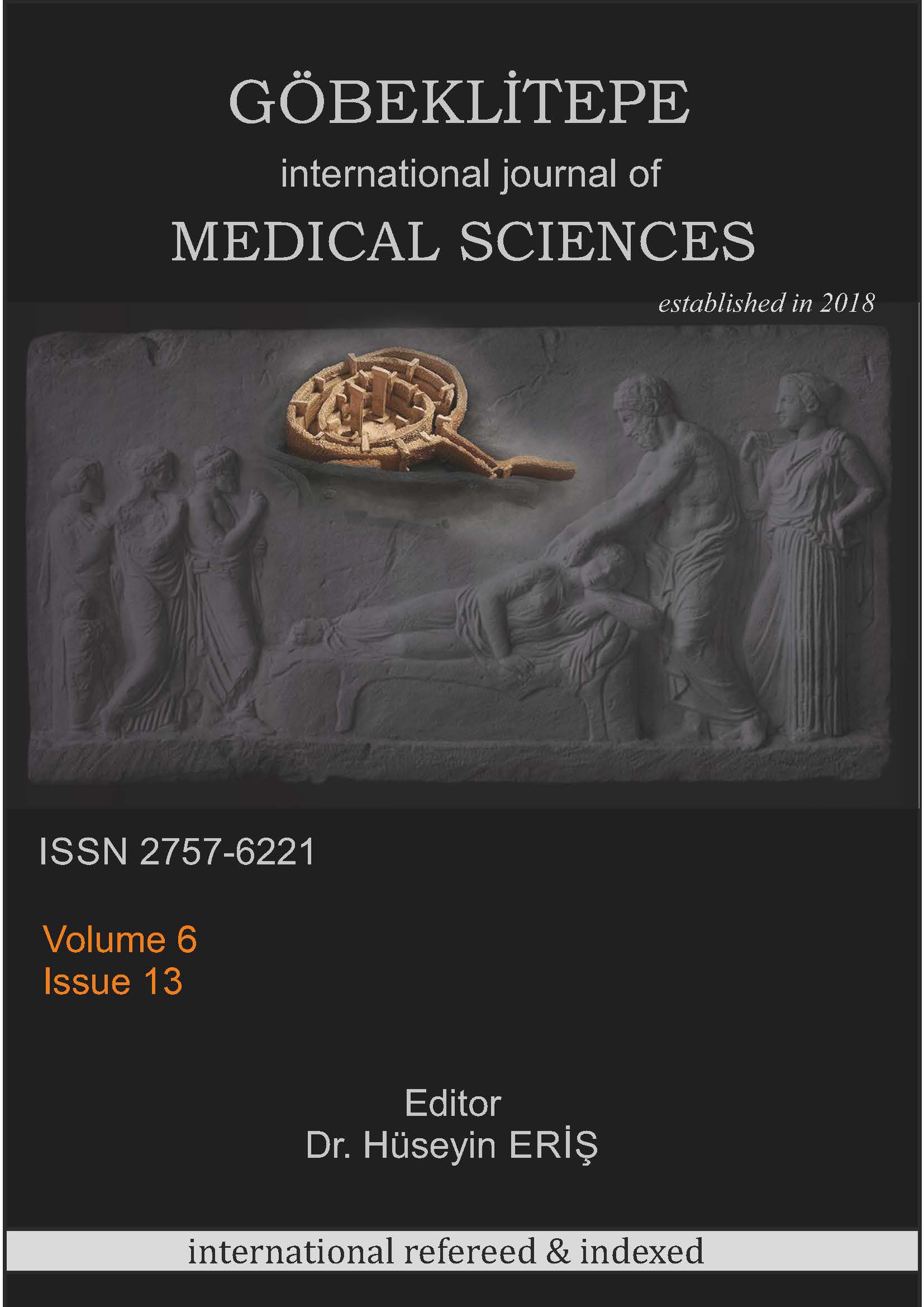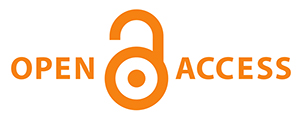NUTRITION AND EXERCISE BEHAVIORS WİTH INTERNET ADDICTION: THE CASE OF CENTRAL ANATOLIA, TURKEY
DOI:
https://doi.org/10.55433/gsbd./206Keywords:
Internet Addiction, Nutrition, Exercise, Student, Nursing, MidwiferyAbstract
This study was conducted to determine the relationship between internet addiction with nutrition and exercise behaviors of university students. This descriptive study was conducted between 20.11.2021 and 20.12.2021 in a Health Sciences Faculty in the Central Anatolian Region of Turkey. The study was completed with 597 university students, reaching 82% of the universe. The data of the study "Information Form", "Internet Addiction Test" and "Nutrition Exercise Behavior Scale" were used. Sperman correlation analysis was used to evaluate the data. The mean age of the students was 20.08±1.06 years, the mean BMI was 21.82±3.10 kg/m2, and 84.8% of them were women. The students' total Nutrition Exercise Behavior Scale mean score was 131.13±18.76 and the Internet Addiction Test mean score was 30.04±10.57. There was a weak positive correlation between the nutrition exercise behavior scale and the internet addiction test mean score (p<0.001). As students' internet addiction increases, psychological eating behavior and unhealthy nutrition exercise behavior increase. It can be suggested that mobile applications or online courses that will support university students in healthy nutrition be given as elective courses.
References
World Health Organization (WHO). Adolescent and Young Adult Health. [Erişim Tarihi 25 Temmuz 2022]. Erişim adresi: https://www.who.int/news-room/fact-sheets/detail/adolescents-health-risks-and-solutions
Hendekci, A., & Avcı, İ. A. (2020). The relationship between internet addiction and nutrition exercise behaviours in adolescents. Ankara Medical Journal, 20(2), 315–326. https://doi.org/10.5505/amj.2020.52533
Yurt, S., & Özdemir, T. (2020). What is the Nutrition and Exercises Behaviour of University Students? Journal of Education and Research in Nursing, 17(3), 238–281. https://doi.org/10.5222/HEAD.2020.58234
Centers for Disease Control and Prevention. Youth Risk Behavior Surveillance System (YRBSS). (2019). [Erişim Tarihi 25 Temmuz 2022]. Erişim adresi: https://www.cdc.gov/healthyyouth/data/yrbs/index.htm
Ying, C. Y., Maria Awaluddin, S., Kuay, L. K., Man, C. S., Baharudin, A., Yn, L. M., Sahril, N., Omar, M. A., Ahmad, N. A., & Ibrahim, N. (2021). Association of internet addiction with adolescents’ lifestyle: a national school-based survey. International Journal of Environmental Research and Public Health, 18(1), 168. https://doi.org/10.3390/IJERPH18010168
Karki, K., Singh, D. R., Maharjan, D., Sushmita, K. C., Shrestha, S., & Thapa, D. K. (2021). Internet addiction and sleep quality among adolescents in a peri-urban setting in Nepal: A cross-sectional school-based survey. PLOS ONE, 16(2), e0246940. https://doi.org/10.1371/JOURNAL.PONE.0246940
Çam, H. H., & Nur, N. (2015). A Study on the prevalence of internet addiction and its association with psychopathological symptoms and obesity in adolescents. TAF Preventive Medicine Bulletin, 14(3), 181–188. https://doi.org/10.5455/pmb.20141016033204
Sidani, J. E., Shensa, A., Hoffman, B., Hanmer, J., & Primack, B. A. (2016). The association between social media use and eating concerns among US young adults. Journal of the Academy of Nutrition and Dietetics, 116(9), 1465–1472. https://doi.org/10.1016/j.jand.2016.03.021
Aldossari, N., & Al-Mahish, M. (2021). Social media and unhealthy food nexus: evidence from Saudi Arabia. Acta Alimentaria, 50(1), 102–111. https://doi.org/10.1556/066.2020.00178
Pilař, L., Stanislavská, L. K., Kvasnička, R., Hartman, R., & Tichá, I. (2021). Healthy food on instagram social network: vegan, homemade and clean eating. Nutrients, 13(6), 1991. https://doi.org/10.3390/NU13061991
Flannery, O., Harris, K., & Kenny, U. A. (2021). An exploration into the impact of social networking site (SNS) use on body image and eating behavior of physically active men. Journal of Men’s Studies, 29(1), 26–49. https://doi.org/10.1177/1060826520913264/FORMAT/EPUB
Turkish Statistical Institute. Turkish Statistical Institute. ( 2021). [Erişim Tarihi 25 Temmuz 2022]. [Erişim Tarihi 25 Temmuz 2022]. Erişim adresi: https://data.tuik.gov.tr/Bulten/Index?p=Istatistiklerle-Genclik-2020-37242#
Holmberg, C., E. Chaplin, J., Hillman, T., & Berg, C. (2016). Adolescents’ presentation of food in social media: An explorative study. Appetite, 99, 121–129. https://doi.org/10.1016/J.APPET.2016.01.0
Arslan, S. A., Daşkapan, A., & Çakır, B. (2016). Specification of nutritional and physical activity habits of university students. TAF Preventive Medicine Bulletin, 15(3), 171–180. https://doi.org/10.5455/pmb.1-1436432564
Garibağaoğlu, M., Budak, N., Öner, N., Sağlam, Ö., & Nişli, K. (2006). The evaluation of nutritional status and body weights of female university students attending three different universities. Journal of Health Sciences, 15(3), 173–180.
Yurt, S., Save, D., & Yıldız, A. (2016). Developing an evalution scale of nutrition exercise behaviours for adolescents; it’s validity and reliability. Türkiye Klinikleri J Public Health Nurs-Special Topics, 2(1), 19–25.
Balta, Ç. Ö., & Horzum, B. (2008). Internet addiction test. Educational Sciences and Practice, 7(13), 87–102. https://www.researchgate.net/publication/272357837
Tayhan Kartal, F., & Yabancı Ayhan, N. (2021). Relationship between eating disorders and internet and smartphone addiction in college students. Eating and Weight Disorders, 26(6), 1853–1862. https://doi.org/10.1007/S40519-020-01027-X
Alpaslan, A. H., Koçak, U., Avci, K., & Uzel Taş, H. (2015). The association between internet addiction and disordered eating attitudes among Turkish high school students. Eating and Weight Disorders, 20(4), 441–448. https://doi.org/10.1007/s40519-015-0197-9
Çelik, Ç. B., Odacı, H., & Bayraktar, N. (2015). Is problematic internet use an indicator of eating disorders among Turkish university students? Eating and Weight Disorders, 20(2), 167–172. https://doi.org/10.1007/S40519-014-0150-3
Alosaimi, F. D., Alyahya, H., Alshahwan, H., Al Mahyijari, N., & Shaik, S. A. (2016). Smartphone addiction among university students in Riyadh, Saudi Arabia. Saudi Medical Journal, 37(6), 675–683. https://doi.org/10.15537/SMJ.2016.6.14430
Turkish Statistical Institute. Household Information Technologies (IT) Usage Survey, 2021. (2021). [Erişim Tarihi 20 Temmuz 2022]. Erişim Adresi: https://data.tuik.gov.tr/Bulten/Index?p=Hanehalki-Bilisim-Teknolojileri-(BT)-Kullanim-Arastirmasi-2021-37437#:~:text=İnternet kullanım oranı 2021 yılında,w%2C5 olduğu görüldü.&text=92%2C0 oldu-,Genişbant ile İnternete erişim sağlayan hanelerin,yılında %92 23. Minaz, A., & Çetinkaya Bozkurt, Ö. (2017). Investigation of university students smartphone addiction levels and usage purpose in terms of different variables. Mehmet Akif Ersoy Üniversitesi Sosyal Bilimler Enstitüsü Dergisi, 9(21), 268–286. https://doi.org/10.20875/makusobed.306903
Kırca, K., & Kutlutürkan, S. (2019). Effect of smart phone addiction levels of nursing students on their communication skills. Kocaeli Üniversitesi Sağlık Bilimleri Dergisi, 5(2), 81–85. https://doi.org/10.30934/kusbed.523924
Konca, E., Ermiş, E., Ermiş, A., & Erilli, N. A. (2019). Analysis of physical activity states and nutritional habits of students between the age of 7 and 14. Journal of Turkish Studies-Social Sciences, 14(1), 105–117. https://doi.org/10.7827/turkishstudies.14821
Sampasa-Kanyinga, H., Chaput, J. P., & Hamilton, H. A. (2015). Associations between the use of social networking sites and unhealthy eating behaviours and excess body weight in adolescents. The British Journal of Nutrition, 114(11), 1941–1947. https://doi.org/10.1017/S0007114515003566
Serenko, A., Turel, O., & Bohonis, H. (2021). The impact of social networking sites use on health-related outcomes among UK adolescents. Computers in Human Behavior Reports, 3, 100058. https://doi.org/10.1016/J.CHBR.2021.100058
Tao, Z. L., & Liu, Y. (2009). Is there a relationship between Internet dependence and eating disorders? A comparison study of Internet dependents and non-Internet dependents. Eating and Weight Disorders - Studies on Anorexia, Bulimia and Obesity, 14(2–3), e77–e83. https://doi.org/10.1007/BF03327803
Rodgers, R. F., Melioli, T., Laconi, S., Bui, E., & Chabrol, H. (2013). Internet addiction symptoms, disordered eating, and body image avoidance. Cyberpsychology, Behavior and Social Networking, 16(1), 56–60. https://doi.org/10.1089/CYBER.2012.1570
Bozkurt, H., Özer, S., Şahin, S., & Sönmezgöz, E. (2018). Internet use patterns and Internet addiction in children and adolescents with obesity. Pediatric Obesity, 13(5), 301–306. https://doi.org/10.1111/IJPO.12216
Downloads
Published
Versions
- 2024-07-02 (2)
- 2023-10-03 (1)
How to Cite
Issue
Section
License
Copyright (c) 2023 Göbeklitepe Sağlık Bilimleri Dergisi

This work is licensed under a Creative Commons Attribution 4.0 International License.




